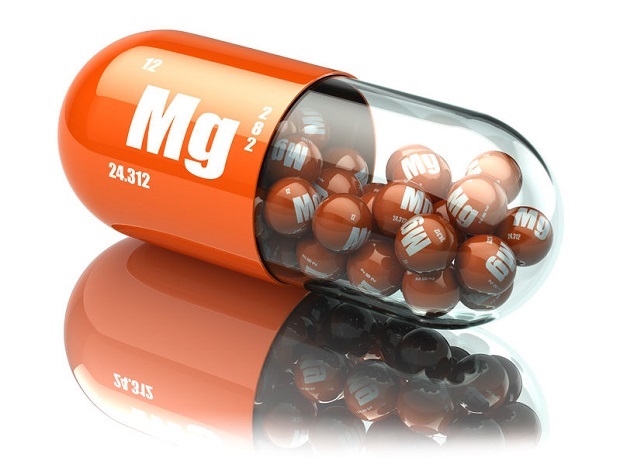
How Much Magnesium Should You Take Each Day?
- The average healthy adult female needs 310-320 mg of magnesium per day.
- The average healthy adult male needs 400-420 mg of magnesium per day.
- While a healthy, varied diet should provide you with all the magnesium you need, most people in the Western world don’t consume enough magnesium.
- Hypermagnesemia can cause serious side effects, so don’t take magnesium supplementation unless directed by a physician.
Because magnesium is essential to over 300 biochemical reactions in the body, it’s important to fulfill your needs. While the short answer is that the average healthy adult female needs between 310-320 mg and the average healthy adult male needs 400-420 mg of magnesium per day, it’s useful to take a deeper look at all the factors involved. [1] The current Recommended Dietary Allowances for Magnesium chart is available at the National Institutes of Health – Office of Dietary Supplements.
Why You Need Magnesium

Magnesium is the fourth most prevalent mineral in the body and is essential to the function of every organ in the body. Magnesium plays a role in muscle and nerve function, regulating heart rhythms, promoting a healthy immune system, and bone health. It is also a key ingredient in protein synthesis, regulating blood sugar levels, and maintaining normal blood pressure. Researchers are also interested in studying magnesium as a treatment for diabetes, cardiovascular disease, and hypertension. [2]
Sources of Magnesium

Your body absorbs between thirty to forty percent of the magnesium you consume. Foods rich in magnesium include green leafy vegetables, whole grains, legumes, nuts, seeds, and halibut. While a healthy, varied diet should provide you with all the magnesium you need, most people in the Western world don’t consume enough magnesium. While low blood magnesium levels are common, clinical magnesium deficiency is rare in the industrialized world. [3]
Magnesium Deficiency

Clinical magnesium deficiencies are relatively rare in the Western world, but certain people are more at risk for them. Temporary magnesium deficiencies can be caused by illnesses or behaviors that cause vomiting or diarrhea. Serious chronic magnesium deficiencies are usually caused by behaviors or illnesses that inhibit the body’s ability to absorb magnesium or maintain normal blood magnesium levels. The most likely culprits are irritable bowel syndrome, Crohn’s disease, diabetes, kidney disease, and alcoholism. [4]
Magnesium Supplementation

Because hypermagnesemia, or the presence of too much magnesium in the blood, can cause serious side effects, including death, physicians recommend not taking magnesium supplements unless directed to by your doctor. No level of magnesium supplementation for infants is considered safe without physician supervision. [5]
Expert Opinion

Quote: “What is the health risk of too much magnesium? Dietary magnesium does not pose a health risk, however pharmacologic doses of magnesium in supplements can promote adverse effects such as diarrhea and abdominal cramping. Risk of magnesium toxicity increases with kidney failure, when the kidney loses the ability to remove excess magnesium. Very large doses of magnesium-containing laxatives and antacids also have been associated with magnesium toxicity.”
Source: Dietary Supplement Fact Sheet: Magnesium
Office of Dietary Supplements; National Institute of Health
Quote: “Magnesium is used as a dietary supplement for individuals who are deficient in magnesium. Although a balanced diet usually supplies all the magnesium a person needs, magnesium supplements may be needed by patients who have lost magnesium because of illness or treatment with certain medicines.”
Source: Magnesium Supplement, Oral Route Parenteral Route
Mayo Clinic
Resources
- [1] [4] National Institutes of Health – Office of Dietary Supplements – “Magnesium – Health Professionals Fact Sheet.”
- [2] Grober, Uwe. “Magnesium in Prevention and Therapy.” Nutrients. 2015; Volume: 7; No: 9; Pages: 8199-8226
- [3] National Institutes of Health – Office of Dietary Supplements – “Magnesium – Health Professionals Fact Sheet.”
- [5] Mount Sinai – “Magnesium Information.“
DISCLAIMER: THIS WEBSITE DOES NOT PROVIDE MEDICAL ADVICE
The information, including but not limited to text, graphics, images, and other material on this website, is for informational purposes only. No material on this site is intended to be a substitute for professional medical advice, diagnosis, or treatment. Always seek the advice of your physician or other qualified healthcare providers with any questions you may have regarding a medical condition or treatment before undertaking a new health care regimen, and never disregard professional medical advice or delay in seeking it because of something you have read on this or any other website.





